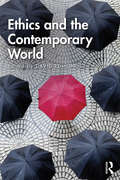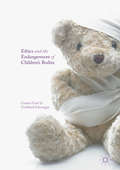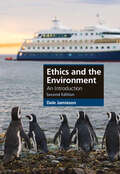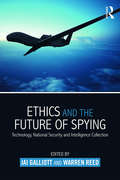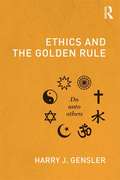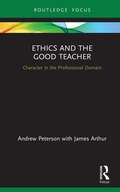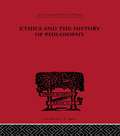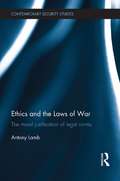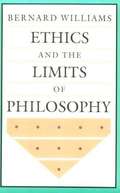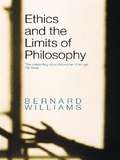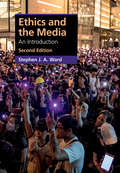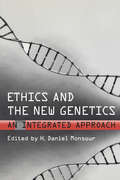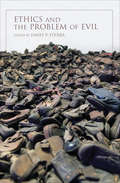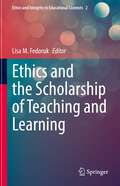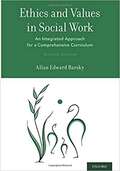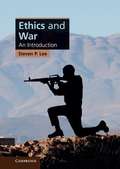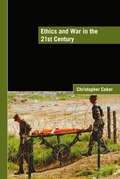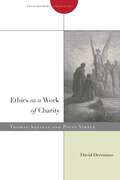- Table View
- List View
Ethics and the Contemporary World
by David EdmondsArguments about ethics often centre on traditional questions of, for instance, euthanasia and abortion. Whilst these questions are still in the foreground, recent years have seen an explosion of new moral problems. Moral and political clashes are now as likely to be about sexuality and gender and the status of refugees, immigrants and borders, or the ethics of social media, safe spaces, disability and robo-ethics. How should we approach these debates? What are the issues at stake? What are the most persuasive arguments? Edited by best-selling philosophy author David Edmonds, Ethics and the Contemporary World assembles a star-studded line-up of philosophers to explore twenty-five of the most important ethical problems confronting us today. They engage with moral problems in race and gender, the environment, war and international relations, global poverty, ethics and social media, democracy, rights and moral status, and science and technology. Whether you want to learn more about the ethics of poverty, food, extremism, or artificial intelligence and enhancement, this book will help you understand the issues, sharpen your perspective and, hopefully, make up your own mind.
Ethics and the Endangerment of Children's Bodies
by Gunter Graf Gottfried SchweigerThis book addresses the endangerment of children's bodies in affluent societies. Bodily integrity is an important part of a child's physical and mental well-being, but it can also be violated through various threats during childhood; not only affecting physical health but also causing mental damage and leading to distortions in the development of the self. The authors give an account of three areas, which present different serious dangers: (1) body and eating, (2) body and sexuality, and (3) body and violence. Through an in-depth examination of the available theoretical and empirical knowledge, as well as a thorough ethical analysis, the central injustices in the mentioned areas are identified and the agents with responsibilities towards children displayed. The authors conclude by providing invaluable insight into the necessity of an ethical basis for policies to safeguard children and their bodies.
Ethics and the Environment: An Introduction (Cambridge Applied Ethics)
by Dale JamiesonThis new edition of a widely used and cited introduction to ethics and the environment offers a broad and lively discussion of nature's future, focusing on climate change, conservation, and justice for both our contemporaries and future generations. It discusses the nature of environmental problems and their relationship to economics, religion, technology, and aesthetics. It includes incisive discussions of our moral relations with other animals, and of how animals are used in our food systems. It also provides a deep discussion of the value of nature, which takes up ecofeminist and deep ecology views as well as sentientism and biocentrism. It discusses the plurality of values, and applies this analysis to some conflicts from the author's home state of California. The volume is comprehensively revised and updated, with several new chapters, and concludes with a compelling discussion of the question “How should I live?” in this new epoch of the Anthropocene.
Ethics and the Future of Capitalism
by Wojciech W. GasparskiWith the collapse of communism and the accelerated trend of globalization, a new stage of capitalism has arrived. Protest actions that occurred in Seattle and Washington as well as in Prague and Genoa, clearly show that the legitimacy of capitalism is being questioned in many respects. Surveys in Eastern and Central Europe show that a considerable part of the population is not able to accept capitalism as an economic system. This volume assesses the ethical basis of capitalism in an effort to assess its future in the twenty-first century.Contributors range from one of the world's most successful capitalists and philanthropists to the founder of INSEAD, Europe's leading business school, to noted economists, philosophers, cultural historians, and business ethicists.
Ethics and the Future of Spying: Technology, National Security and Intelligence Collection (Studies in Intelligence)
by Jai Galliott Warren ReedThis volume examines the ethical issues generated by recent developments in intelligence collection and offers a comprehensive analysis of the key legal, moral and social questions thereby raised. Intelligence officers, whether gatherers, analysts or some combination thereof, are operating in a sea of social, political, scientific and technological change. This book examines the new challenges faced by the intelligence community as a result of these changes. It looks not only at how governments employ spies as a tool of state and how the ultimate outcomes are judged by their societies, but also at the mind-set of the spy. In so doing, this volume casts a rare light on an often ignored dimension of spying: the essential role of truth and how it is defined in an intelligence context. This book offers some insights into the workings of the intelligence community and aims to provide the first comprehensive and unifying analysis of the relevant moral, legal and social questions, with a view toward developing policy that may influence real-world decision making. The contributors analyse the ethics of spying across a broad canvas – historical, philosophical, moral and cultural – with chapters covering interrogation and torture, intelligence’s relation to war, remote killing, cyber surveillance, responsibility and governance. In the wake of the phenomena of WikiLeaks and the Edward Snowden revelations, the intelligence community has entered an unprecedented period of broad public scrutiny and scepticism, making this volume a timely contribution. This book will be of much interest to students of ethics, intelligence studies, security studies, foreign policy and IR in general.
Ethics and the Golden Rule
by Harry J GenslerIt is commonly accepted that the golden rule—most often formulated as "do unto others as you would have them do unto you"—is a unifying element between many diverse religious traditions, both Eastern and Western. Its influence also extends beyond such traditions, since many non-religious individuals hold up the golden rule as central to their lives. Yet, while it is extraordinarily important and widespread, the golden rule is often dismissed by scholars as a vague proverb that quickly leads to absurdities when one attempts to formulate it in clear terms. In this book, Harry J. Gensler defends the golden rule and addresses all of the major philosophic objections, pointing out several common misunderstanding and misapplications. Gensler first discusses golden-rule reasoning and how to avoid the main pitfalls. He then relates the golden rule to world religions and history, and to areas like moral education, egoism, evolution, society, racism, business, and medicine. The book ends with a discussion of theoretical issues (like whether all morality reduces to the golden rule, which the author argues against). Ethics and the Golden Rule offers two introductory chapters, the first is simpler and the second more technical; a reader may start with either or both. One can then read any combination of further chapters, in any order, depending on one’s interests; but Chapters 13 and 14 are technical and assume one has read Chapter 2. This is "a golden-rule book for everyone," accessible to a wide readership.
Ethics and the Good Teacher: Character in the Professional Domain (Character and Virtue Within the Professions)
by Andrew Peterson James ArthurEthics and the Good Teacher brings together reviews of existing literature and analysis of empirical data from three research projects conducted by the Jubilee Centre for Character and Virtues – The Good Teacher, Schools of Virtue and Teacher Education – to explore the ethical dimensions of the teaching profession. The book is premised on the idea that what constitutes a "good" teacher involves more than technical skills and subject knowledge. Understood as a professional activity, teaching involves an important ethical dimension, a fact that has come under increased scrutiny – and some would argue increased threat – over recent years as education and schooling have become shaped by market logic and accountability. Addressing the influence of personal and professional character on teachers and teaching, and containing clear implications for policy, practice and research, this book will be of great interest to teachers and other professionals working in education settings, as well as those working in educational policy. It will also appeal to academics, undergraduate students and postgraduate students researching the teaching profession and ethics/morality in education more generally.
Ethics and the History of Philosophy: Selected Essays (International Library of Philosophy)
by C.D. BroadFirst published in 2000. Routledge is an imprint of Taylor & Francis, an informa company.
Ethics and the Laws of War: The Moral Justification of Legal Norms (Contemporary Security Studies)
by Antony LambThis book is an examination of the permissions, prohibitions and obligations found in just war theory, and the moral grounds for laws concerning war. Pronouncing an action or course of actions to be prohibited, permitted or obligatory by just war theory does not thereby establish the moral grounds of that prohibition, permission or obligation; nor does such a pronouncement have sufficient persuasive force to govern actions in the public arena. So what are the moral grounds of laws concerning war, and what ought these laws to be? Adopting the distinction between jus ad bellum and jus in bello, the author argues that rules governing conduct in war can be morally grounded in a form of rule-consequentialism of negative duties. Looking towards the public rules, the book argues for a new interpretation of existing laws, and in some cases the implementation of completely new laws. These include recognising rights of encompassing groups to necessary self-defence; recognising a duty to rescue; and considering all persons neither in uniform nor bearing arms as civilians and therefore fully immune from attack, thus ruling out ‘targeted’ or ‘named’ killings. This book will be of much interest to students of just war theory, ethics of war, international law, peace and conflict studies, and Security Studies/IR in general.
Ethics and the Limits of Philosophy
by Bernard WilliamsIn this book Bernard Williams delivers a sustained indictment of moral theory from Kant onward. His goal is nothing less than to reorient ethics toward the individual. He deals with the most thorny questions in contemporary philosophy and offers new ideas about issues such as relativism, objectivity, and the possibility of ethical knowledge.
Ethics and the Limits of Philosophy (Routledge Classics)
by Bernard WilliamsWith a new foreword by Jonathan Lear 'Remarkably lively and enjoyable…It is a very rich book, containing excellent descriptions of a variety of moral theories, and innumerable and often witty observations on topics encountered on the way.' - Times Literary Supplement Bernard Williams was one of the greatest philosophers of his generation. Ethics and the Limits of Philosophy is not only widely acknowledged to be his most important book, but also hailed a contemporary classic of moral philosophy. Drawing on the ideas of the Greek philosophers, Williams reorients ethics away from a preoccupation with universal moral theories towards ‘truth, truthfulness and the meaning of an individual life’. He explores and reflects upon the most difficult problems in contemporary philosophy and identifies new ideas about central issues such as relativism, objectivity and the possibility of ethical knowledge. This edition also includes a commentary on the text by A.W.Moore. At the time of his death in 2003, Bernard Williams was hailed by the Times as 'the outstanding moral philosopher of his age.' He taught at the Universities of Cambridge, Berkeley and Oxford and is the author of many influential books, including Morality; Descartes: The Project of Pure Enquiry (available from Routledge) and Truth and Truthfulness.
Ethics and the Limits of Philosophy (Routledge Classics Ser.)
by Bernard WilliamsBy the time of his death in 2003, Bernard Williams was one of the greatest philosophers of his generation. Ethics and the Limits of Philosophy is not only widely acknowledged to be his most important book, but also hailed a contemporary classic of moral philosophy. Presenting a sustained critique of moral theory from Kant onwards, Williams reorients ethical theory towards ‘truth, truthfulness and the meaning of an individual life’. He explores and reflects upon the most difficult problems in contemporary philosophy and identifies new ideas about central issues such as relativism, objectivity and the possibility of ethical knowledge. This edition also includes a new commentary on the text by A.W.Moore and a foreword by Jonathan Lear.
Ethics and the Market (In association with Society for Applied Philosophy)
by Richard NormanDespite the continuing dominance of market relations and market forces in contemporary society, there remain fundamental questions about the ethical acceptability of markets and their effects. This collection, based on the 1998 conference of the Society for Applied Philosophy, brings philosophical analysis and argument to bear on these questions. Papers in the first half of the volume examine the relation between the market and central ethical concepts - concepts of value, quality of life, quality of environment, community, equality of opportunity and morality itself. In the second part, the focus is on the relation between markets and specific social phenomena such as privatization, poverty and exclusion, the ’ethical consumer’ movement and the operation of market principles in the National Health Service. The views and arguments presented in the papers do not stem from any single moral or philosophical perspective, but together they add up to a comprehensive review of the ethical problems raised by market societies. The book will be of interest to students and researchers in philosophy, economics, business studies, politics and social theory and to anyone interested in the effect of market forces on the quality of our lives.
Ethics and the Media: An Introduction (Cambridge Applied Ethics)
by Stephen J. WardNow revised and containing several new chapters, this book provides a comprehensive set of ethical principles and methods of reasoning for a new era of digital, global media. It describes the turbulent state of media ethics in ordinary language and through clear examples, and provides a pragmatic theory of truth and objectivity for engaged media. Concrete guidelines are articulated for identifying fake news and for reporting responsibly on social media racism, extreme groups, and anti-democratic demagogues, showing how citizens and journalists can work together to detox a polluted public sphere. The book examines global media ethics, where norms guide the reporting of global issues such as climate change and immigration, and considers what constitutes responsible journalism. It will be valuable for both students and practitioners of journalism and media ethics, and can also be used as a citizen's guide for evaluating media reports.
Ethics and the New Genetics: An Integrated Approach (Lonergan Studies)
by H. Daniel MonsourEveryday, new advances are being made in the science of human genetics. Accompanying progress in this area, however, are new ethical dilemmas. At a think tank sponsored by the Canadian Catholic Bioethics Institute, an interdisciplinary group of ethicists, geneticists, physicians, lawyers, and theologians gathered in an attempt to apply some features of Bernard Lonergan's notion of functional specialization to ethical debates surrounding genetics. Editor H. Daniel Monsour has brought together a series of articles presented at this think tank. The articles accomplish two tasks: first, they explore some of the advances in human genetic that continue to prompt ethical debate and outline the different stances on those issues; second, they examine those stances in the context of Roman Catholic moral and religious thought. Timely, innovative, and wide-ranging, this collection will be of interest to bioethicists and philosophers, as well as religious and Lonerganian scholars.
Ethics and the Orator: The Ciceronian Tradition of Political Morality
by Gary A. RemerFor thousands of years, critics have attacked rhetoric and the actual practice of politics as unprincipled, insincere, and manipulative. In Ethics and the Orator, Gary A. Remer disagrees, offering the Ciceronian rhetorical tradition as a rejoinder. He argues that the Ciceronian tradition is based on practical or “rhetorical” politics, rather than on idealistic visions of a politics-that-never-was—a response that is ethically sound, if not altogether morally pure. Remer’s study is distinct from other works on political morality in that it turns to Cicero, not Aristotle, as the progenitor of an ethical rhetorical perspective. Contrary to many, if not most, studies of Cicero since the mid-nineteenth century, which have either attacked him as morally indifferent or have only taken his persuasive ends seriously (setting his moral concerns to the side), Ethics and the Orator demonstrates how Cicero presents his ideal orator as exemplary not only in his ability to persuade, but in his capacity as an ethical person. Remer makes a compelling case that Ciceronian values—balancing the moral and the useful, prudential reasoning, and decorum—are not particular only to the philosopher himself, but are distinctive of a broader Ciceronian rhetorical tradition that runs through the history of Western political thought post-Cicero, including the writings of Quintilian, John of Salisbury, Justus Lipsius, Edmund Burke, the authors of The Federalist, and John Stuart Mill.
Ethics and the Problem of Evil (Indiana Series in the Philosophy of Religion)
by Marilyn McCord Adams John Hare Linda Zagzebski Laura Garcia Bruce Russell Stephen J. Wykstra Stephen MaitzenProvocative essays that seek &“to turn the attention of analytic philosophy of religion on the problem of evil . . . towards advances in ethical theory&” (Reading Religion). The contributors to this book—Marilyn McCord Adams, John Hare, Linda Zagzebski, Laura Garcia, Bruce Russell, Stephen Wykstra, and Stephen Maitzen—attended two University of Notre Dame conferences in which they addressed the thesis that there are yet untapped resources in ethical theory for affecting a more adequate solution to the problem of evil. The problem of evil has been an extremely active area of study in the philosophy of religion for many years. Until now, most sources have focused on logical, metaphysical, and epistemological issues, leaving moral questions as open territory. With the resources of ethical theory firmly in hand, this volume provides lively insight into this ageless philosophical issue. &“These essays—and others—will be of primary interest to scholars working in analytic philosophy of religion from a self-consciously Christian standpoint, but its audience is not limited to such persons. The book offers illustrative examples of how scholars in philosophy of religion understand their aims and how they go about making their arguments . . . hopefully more work will follow this volume&’s lead.&”—Reading Religion &“Recommended.&”—Choice
Ethics and the Quest for Wisdom
by Robert KaneModernity has challenged the ancient ideal of a universal quest for wisdom, and today's world of conflicting cultures and values has raised further doubts regarding the possibility of objective ethical standards. Robert Kane refocuses the debate on the philosophical quest for wisdom, and argues that ethical principles about right action and the good life can be seen to emerge from that very quest itself. His book contends that the search for wisdom involves a persistent striving to overcome narrowness of vision that comes from the inevitable limitations of finite points of view. When applied to questions of value and the good life, this striving has ethical implications about the way we should treat ourselves and others. This study argues for the merits of this central thesis against alternative theories in contemporary normative ethics, and discusses its practical applications for social ethics, political philosophy, law and moral education.
Ethics and the Scholarship of Teaching and Learning (Ethics and Integrity in Educational Contexts #2)
by Lisa M. FedorukThis book addresses issues related to ethics and the scholarship of teaching and learning, and pays special attention to ethical concerns and experiences that have arisen from engaging in Scholarship of Teaching and Learning (SoTL) work. The book draws on a range of research projects, theoretical frameworks and narrative experiences to provide multiple perspectives of how meaning is made of research ethics in SoTL, academic community and REB partnerships, experiences of Students as Partners in SoTL, and ethically-minded approaches to teaching, learning and inquiry. Specifically, this edited book includes ethical practices that have become increasingly expansive in an ever-evolving academic environment such as navigating pandemic pedagogy and data ownership due to increased online content. In addition, contributions pertaining to academic community partnerships between REBs and faculty detail realistic narratives and lessons learned about how higher education can become more equitable, diverse and inclusive. Subsequently, decolonial ethics for teaching and learning in higher education, as well as participatory parity, exemplify the need for SoTL practitioners to be responsive to the social and cultural realities of a global context in ways that address social inequities and social responsibility. Relational ethics by way of student perspectives on vulnerability and classroom-based SoTL research underscore the need for students to be taught about their own agency as a means of providing student voice within SoTL work. Lastly, this book celebrates how ethically-minded approaches to teaching, learning and inquiry uncover strategies and pedagogy that encourage concepts such as ethical imagination and systems and design thinking practices.
Ethics and the University (Professional Ethics)
by Michael DavisEthics and the University brings together two closely related topics, the practice of ethics in the university ("academic ethics") and the teaching of practical or applied ethics in the university. This volume is divided into four parts: * A survey of practical ethics, offering an explanation of its recent emergence as a university subject, situating that subject into a wider social and historical context and identifying some problems that the subject generates for universities * An examination of research ethics, including the problem of plagiarism * A discussion of the teaching of practical ethics. Michael Davis explores how ethics can be integrated into the university curriculum and what part particular cases should play in the teaching of ethics * An exploration of sexual ethics Ethics and the University provides a stimulating and provocative analysis of academic ethics which will be useful to students, academics and practitioners.
Ethics and Values in Healthcare Management (Professional Ethics)
by Souzy DracopoulouHealthcare management is a burning issue at the moment and this timely and topical book explores the ethical issues that arise in the context of healthcare management. Among the topics discussed are healthcare rationing, including an exposition and defence of the Qaly criterion of healthcare rationing and an examination of the contribution that ethical theory can make to the rationing debate, an analysis of how managers can be preoccupied with the goals of management and the values of doctors simultaneously, an outline of potential guidelines towards formulating a cohesion of healthcare management and ethical management and a reassessment of the role of healthcare professionals. Ethics and Values in Healthcare Management provides a valuable and much needed analysis of the ethical problems associated with healthcare management and offers some solutions towards ameliorationg healthcare organisations.
Ethics and Values in Social Work: An Integrated Approach for a Comprehensive Curriculum
by Allan Edward BarskySocial work ethics provide practitioners with guidance on how to promote social work values such as respect, social justice, human relationships, service, competence, and integrity. Students entering the profession need to develop a real-world understanding of how to apply these values in practice while also managing the dilemmas that arise when social workers, clients, and others encounter conflicting values and ethical obligations. <p><p>Ethics and Values in Social Work offers a comprehensive set of teaching and learning materials to help students develop the knowledge, self-awareness, and critical thinking skills required to handle values and ethical issues in all levels of practice--individual, family, group, organization, community, and social policy. BSW and MSW students will particularly appreciate how complex ethical obligations and theories have been translated into plain language. Additionally, the comprehensive set of case examples and exercises provides realistic scenarios to develop critical thinking and problem solving skills across a range of practice situations.
Ethics and War: An Introduction
by Steven P. LeeWhat are the ethical principles underpinning the idea of a just war and how should they be adapted to changing social and military circumstances? Steven P. Lee presents the basic principles of just war theory, showing how they evolved historically and how they are applied today in global relations. He examines the role of state sovereignty and individual human rights in the moral foundations of just war theory and discusses a wide range of topics including humanitarian intervention, preventive war, the moral status of civilians and enemy combatants, civil war and terrorism. He shows how just war theory relates to both pacifism and realism. Finally, he considers the future of war and the prospects for its obsolescence. His clear and wide-ranging discussion, richly illustrated with examples, will be invaluable for students and other readers interested in the ethical challenges posed by the changing nature of war.
Ethics and War in the 21st Century (Lse International Studies Ser.)
by Christopher CokerThis book explores the ethical implications of war in the contemporary world. The author, a leading theorist of warfare, explains why it is of crucial importance that Western countries should continue to apply traditional ethical rules and practices in war, even when engaging with international terrorist groups.The book uses the work of the late Am
Ethics as a Work of Charity: Thomas Aquinas and Pagan Virtue
by David DecosimoMost of us wonder how to make sense of the apparent moral excellences or virtues of those who have different visions of the good life or different religious commitments than our own. Rather than flattening or ignoring the deep difference between various visions of the good life, as is so often done, this book turns to the medieval Christian theologian Thomas Aquinas to find a better way. Thomas, it argues, shows us how to welcome the outsider and her virtue as an expression rather than a betrayal of one's own distinctive vision. It shows how Thomas, driven by a Christian commitment to charity and especially informed by Augustine, synthesized Augustinian and Aristotelian elements to construct an ethics that does justice#151;in love#151;to insiders and outsiders alike. Decosimo offers the first analysis of Thomas on pagan virtue and a reinterpretation of Thomas's ethics while providing a model for our own efforts to articulate a truthful hospitality and do ethics in our pluralist, globalized world.
